- Home
- Kirsty Murray
The Year It All Ended Page 7
The Year It All Ended Read online
Page 7
The young woman let out a small moan and Captain Oliphant patted her shoulder comfortingly.
‘You must all join hands,’ said Tilda. ‘Do not let go of your neighbour’s hand, or the chain will be broken.’
The curtains were drawn, blocking out the afternoon sun. The room felt stuffy and close. A candle on the mantelpiece glowed blue and Tiney shivered despite the heat.
The first voice that came from Mrs Constance-Higgens was deep and rich. It was extraordinary to hear a man’s voice emanating from this thin, pale woman.
‘I am the Healing Master,’ the voice said. ‘My dear friend Angelica gives me a vessel through which I can share with you. I come to speak of the world of the spirit, to reassure you that you will find peace when you cross over to join us.’
Tiney felt Minna’s hand grip hers tighter and she squeezed back.
Then Mrs Constance-Higgen’s head tipped back and she made a gurgling sound in her throat. When she spoke again, it was in a completely different voice, in a language that no one understood.
‘Is that you, Chief?’ asked Tilda.
‘Oginali,’ said Mrs Constance-Higgens. ‘Otsalanvlvi.’
‘What is she saying?’ asked the soldier.
‘The Chief is welcoming us as his friends. He says we are all brothers and sisters,’ said Captain Oliphant.
‘What language is that?’ asked Tiney.
‘Cherokee Indian. From America,’ whispered Captain Oliphant.
Mrs Constance-Higgens groaned, and Tilda spoke sharply to Tiney. ‘Please do not converse while the spirits are manifesting unless given permission to do so.’
Mrs Constance-Higgens tossed her head from side to side as if in pain and then a third voice came from her. This time, though still using a man’s voice, the spirit spoke in English. Not only in English but in rhyme, with a smooth, elegant British accent.
‘And “art is long”, and “life is short”,
And man is slow at learning;
And yet by divers dealings taught,
For divers follies yearning,
He owns at last, with grief downcast
(For man disposed to grieve is) –
One adage old stands true and fast,
“Ars longa, vita brevis.”’
‘I know that poem,’ said Tiney. ‘That’s by Adam Lindsay Gordon.’
‘Shhh!’ said Tilda irritably.
The voice continued.
‘I am the poet you know well,
Now in a realm of ether
I come with many truths to tell
Death my noble teacher
Your lads that fought so brave and strong
Now rest as heroes near me
This night they’ll speak to you ere long
And share their secrets with thee.’
‘He definitely didn’t write that bit,’ said Tiney in an undertone. Minna squeezed her hand so hard that she winced.
The medium began to moan again and Tilda spoke. ‘Mother feels there are negative vibrations in the room. Unbelievers will deter the spirits from entering her.’
‘No, we all believe,’ cried the old woman to Tiney’s left, leaning forward. ‘Don’t let our boys be deterred by a chit of a girl.’ She glared at Tiney.
Mrs Constance-Higgens began to cough and gag and writhe. Her cheeks billowed out and something began to emerge from her mouth. The soldier’s sister let out a shriek and tried to draw away from the table.
‘Don’t let go of each other’s hands!’ cried Tilda. ‘You must hold fast. Don’t be afraid.’
‘What’s happening?’ whimpered the soldier’s sister.
‘I don’t like this,’ said the soldier.
‘It’s all right, young chap,’ said Captain Oliphant. ‘It’s ectoplasm – the spirit made flesh – a manifestation from the other side.’
The medium coughed and coughed until she disgorged a wad of stringy substance, flecked with bits of blood. Tiney watched in disgust as a second long, flesh-white lump coated in saliva began to ooze out of Mrs Constance–Higgens’ mouth onto the black velvet tablecloth. Everyone stared. Tiney let go of Captain Oliphant’s hand and reached out to touch it.
‘Don’t!’ shrieked Tilda. ‘Touching ectoplasm is dangerous – you could kill my mother. On the ectoplasm will appear the image of the first spirit who will speak tonight. Spirit, name yourself!’
Captain Oliphant reached for Tiney’s hand again and held it tightly. Then the air seemed to shimmer around them. One of the young women peered closely at the white lump in horror. ‘It’s Alan. I can see his face. My Alan. Oh my God,’ she said, breaking into sobs. ‘Alan, Alan, are you there?’
The voice that came out of the medium was soft and deep. ‘Elsie, my Elsie.’
‘Yes, I’m here,’ said Elsie, leaning across the table as if she might kiss Mrs Constance-Higgens.
‘You’re wearing my ring, Elsie. But I don’t hold you to your promise. I want you to go to the ball and dance all night, as we did. Those boys who come back, they need you, Elsie. I’m at peace. At peace.’
‘Alan, is Percy McCaffrey with you?’ asked Minna.
Elsie looked at Minna with a hurt expression. Then she turned to Mrs Constance-Higgens. ‘Don’t leave, Alan, don’t go yet,’ she cried.
‘Minna?’ came a different voice. ‘Why do you seek me and not your brother Louis?’
Minna gasped. ‘Percy, we miss you too, Percy.’ Silvery tears were coursing down her face.
‘It’s George that’s for you. Let me go, Minna.’
Tiney stared at her sister. ‘Minna?’ she whispered. She longed for the séance be over, for them both to be out of the hot, dark room. She shut her eyes, felt a trickle of sweat down the back of her neck.
Mrs Constance-Higgens began to hum and then the humming turned into words. ‘Minna, Martina, little Tiney,’ she said, again in a man’s voice. ‘Why do you seek Percy McCaffrey instead of me, your own brother?’
Tiney felt a little prick of irritation. Louis had never called her Martina and hardly ever Tiney. She was always his ‘Titch’.
‘Do you want to ask Louis a question, Tiney?’ said Tilda, gently. ‘He won’t stay with Mother for long. There are hundreds, thousands of soldiers seeking a voice through her.’
Tiney shook her head. She didn’t want to hear another word emanate through the lips of Mrs Constance-Higgens. But as she tried to slip her hand out of Captain Oliphant’s again, the table began to twitch. It rose up inches from the floor and shook. The little mound of ectoplasm wobbled and Elsie and Minna began to weep hysterically.
‘Stay calm,’ said Captain Oliphant. ‘It’s these girls’ brother sending them a sign, that’s all.’
Tiney sank back into her seat, wishing she could disappear.
The rest of the séance seemed interminably long as more dead soldiers spoke through the medium. The elderly couple had lost three of their sons and each one sent a brief, cryptic message from the grave. Captain Oliphant’s nephew spoke too.
Finally, the voice of the Healing Master returned. He sounded both wearier and more pompous than he had at the beginning of the evening. As he finished speaking, Mrs Constance-Higgens began to swoon. Suddenly, she fell forward across the table, her hair coming loose and spreading like cobwebs across the black velvet. Tilda quickly scooped the pile of ectoplasm into a bowl and then she and Captain Oliphant helped Mrs Constance-Higgens to her feet and led her from the room. The séance was over.
The guests sat in stunned silence. The grieving old mother wept silently, tears dripping from her chin into her lap. Her husband studied his hands. The soldier took out a silver cigarette case and lit up.
When Tilda returned she said, ‘Mother is too exhausted to come out. There was so much pressure from the other side, too many men seeking communion with us. I’m afraid it will take her days to recover. However, she whispered that she was glad to be of service to you all and hopes you found some solace. She asks nothing of you but that you think of her kindly. Sh
e will be giving a public trance on Saturday evening at the drill hall, for which she’ll charge a small fee. This séance was a gift to you all, but if you do wish to repay Mother’s kindness you may leave something in the crystal bowl on the mantelpiece.’
Captain Oliphant was first to place a thick roll of notes into the bowl. The elderly couple whispered to each other and then the old man followed suit. Tiney thought they must have put in forty pounds between them. One by one, the guests put coins and pound notes into the bowl. Elsie even took off one of her rings and dropped it in among the cash. Tiney felt uneasy, as if everyone was watching them, especially Captain Oliphant. Then Minna reached into her bag and pulled out her cloth purse.
‘What are you doing?’ whispered Tiney. ‘You’re not going to give them any money, are you? It wasn’t Louis, you know it wasn’t him.’
Minna frowned. ‘But that was Percy. I’m sure it was. And what if we just can’t remember what Louis’ voice sounds like any more? It’s been over four years.’
Tiney rolled her eyes. Before she could stop her, Minna had slipped a whole pound note into the crystal bowl on the mantelpiece.
In the street, the two girls walked swiftly to the tram stop. Tiney wanted to run. It was such a relief to be out in the open again and she could barely suppress her fury.
Minna stared out the window as the tram rattled back across town. Tiney wanted to shake her. ‘That was awful. Why did you want to talk to Percy?’ she asked.
‘Why do you think? It was Percy that I loved. Now I’m meant to like George, as if one brother is as good as another.’
‘Percy? You never said a word about loving Percy! You were only sixteen when he went to war. But you do like George, just a little, don’t you? He was always the handsome one,’ said Tiney.
Minna pursed her lips and stared at her little sister. ‘George is mad. Whether it was the mustard gas or the whisky, he’s not right. But I’m not allowed to say it out loud. I’m meant to pretend that I like him when I don’t.’
She turned to Tiney, grasping both her hands. ‘Did you read about that girl down in Port Pirie who broke off with her fiancé when he came back?’
‘You mean the one who died?’
‘Tiney, she didn’t die. Her fiancé shot her. He murdered her and then he turned the gun on himself.’
‘Maybe it was an accident,’ said Tiney, desperate to make sense of the tragedy.
‘It wasn’t an accident. And it’s happened to other girls.’
‘I know it’s ghastly, but surely you’re not afraid that George would do that, are you?’
‘Probably not. George seems more broken than twisted. But who can know anyone now? The war has turned those boys inside out, and the skins they’re wearing, they’re not the skins they left home in.’
‘But Minna, we have to remember what they went through, always.’
Minna sighed and cupped her hands around her chin. ‘No one had a kind word to say about that dead girl from Port Pirie. They all thought she was awful and a coward for not going through with marrying her soldier. Tilda said she deserved to die. But does anyone deserve a life of misery with a man they don’t love, just because he fought in the war?’
‘You don’t have to marry George,’ said Tiney.
‘He hasn’t asked – yet,’ said Minna, worrying the edge of her sleeve, plucking at the frayed edge.
‘If he does ask, you can say no,’ said Tiney. ‘Just because Nette got married, it doesn’t mean you have to as well.’
‘Sometimes I feel I have to marry someone and yet there’s hardly anyone left,’ said Minna, staring gloomily out the window at the darkened street. Tiney followed her gaze. She understood how Minna felt – they were pitching forward into an uncertain future.
Hope tests its wings
‘If I have to wear this stupid mask for another month longer, I’ll lose my mind,’ said Ida Alston as she pulled off her wimple and face-mask and flung them onto the table in the little kitchen of the Cheer-Up Hut. ‘We can’t go on acting as if the world is coming to an end because of that ruddy Spanish influenza.’
‘It does feel as though the quarantine is going to last forever,’ said Tiney, sweeping carrot peelings into the bin. ‘The newspaper said there are more than two hundred people in hospital and they still haven’t opened the schools. I was thinking of applying for a position as a teacher’s aide or sitting the examination but I don’t even know when they’re going to set the exams for admission to the College.’
‘It’s not stopping everyone from celebrating. The Victory Ball at the Town Hall is going ahead in July. Even the Refused Volunteers Society is holding a Masque ball next month. You know they’ve asked for the Cheer-Ups to help with refreshments.’
Tiney let out a small groan. ‘I always seem to be serving at parties. I never get to dance or have any fun. You know, Ida, I don’t think I can go on being a Cheer-Up much longer. It’s not the same without Nette and I just don’t feel cheerful enough any more.’
Ida quietly shut the door that opened onto the main kitchen, pulled up a bentwood chair, and kicked off her shoes.
‘I know exactly what you mean. I’m feeling ragged myself.’ She lifted one of her feet onto her lap and began rubbing her ankle. ‘I shouldn’t complain in front of you, kid. I’ve done more than my fair share of dancing. It’s such a silly rule not to allow girls under eighteen to join the fun. But don’t worry. You can come to our party and dance all night if you like.’
‘I thought you’d cancelled because your mother was worried about the epidemic?’
‘She’s almost as fed up as me. Besides, they say the restrictions will be eased at the end of the month. And there are boys coming home in droves. We have to welcome them. If Charlie was one of them we would have thrown a ball the minute he stepped off the ship, influenza be damned.’
‘But they’ve stopped the interstate trains and they’re even going to stop the HMS Australia from landing.’
‘Pooh. That won’t stop us. There are thousands who’ve come home already. Mother has said we should go ahead regardless. We’re going to host a proper masquerade ball, the sort the Society of Arts should be organising. We’re going to beat those Refused Volunteers to the punch and throw the most gorgeous fancy-dress extravaganza imaginable.’
Tiney had never realised what a tonic the idea of a party could be. For two weeks, the Flynn sisters talked about nothing but the Alstons’ ball. Even Mama put down her embroidery and helped with their costumes. Minna had made a special arrangement with Mr Timson, the cloth merchant, providing extra lessons for his daughter in exchange for lengths of cloth, and now the sisters were busy designing their own outfits. Even Thea was excited. So often, Thea politely declined invitations to parties and retreated to her studio. But from the moment the Alstons’ invitation arrived, she’d begun counting the days until the masque ball.
It was Thea’s idea that they should all go as Commedia dell’Arte characters, Harlequin, Pierrot and Columbine. She found a beautiful postcard of the trio and set it upon the dresser in her bedroom for inspiration.
Minna sewed pink and black diamond-shaped pieces of material together to make Harlequin fabric for herself. Tiney was to go as Pierrot and Thea as Columbine.
They made their fancy-dress masks from cardboard and plaster of Paris and Thea painted these carefully to match their outfits. Mama lent her ‘special’ sewing box, filled with tiny beads, coloured threads and feathers. She even showed Tiney how to make black pompoms to sew onto her Pierrot outfit.
On the evening of the ball, Tiney stood before the mirror admiring her silky-smooth white costume. Minna had helped her make white ruffs for the collar, sleeves and ankles and sewn a few artfully placed black circles on the shining satin. Tiney gathered up her long blonde hair and tucked it under a black skullcap. With her face painted white, her lips a small red bow and her features carefully highlighted in black, she looked like a perfect Parisian Pierrot.
Minna had surprised them by
coming home with her hair cut into a sleek bob. Mama gasped in horror but Tiney and Thea clapped their hands in admiration. On the night of the party, Minna trained a dark lock on her forehead into a kiss curl. She wore a full black skirt and black leggings topped by an elaborate sleeveless blouse fashioned from the Harlequin fabric. A luxurious pink-and-black checked turban with a long swathe of fabric was draped like a scarf across her shoulder.
Thea was annoyingly secretive about her Columbine outfit and was still sewing rosettes onto the skirt when Thea and Tiney were ready to leave.
‘You go ahead,’ she said, waving them towards the door.
‘We can’t go without you,’ said Tiney.
‘Papa will walk me to the party when he takes his evening stroll. Don’t worry, I won’t be far behind you.’
Tiney and Minna set out to walk the few blocks to the Alstons. The evening was unusually warm for May and Tiney wasn’t surprised when Minna stopped and took off her coat. But then Minna hung it over a fence and proceeded to take off her skirt.
‘What are you doing?’ asked Tiney.
‘Mama would have scolded me if I’d left the house without an underskirt but I designed the blouse to work as a skirt. It’s much more stylish without all those layers of fabric.’
Minna stripped off and stuffed the black skirt into her raffia basket, then adjusted the folds of the pink-and-black diamond blouse so its pocket-handkerchief hem reached just above her knees. The carefully draped folds of fabric made Minna look svelte and stylish.
‘Is it too risqué?’ asked Minna, suddenly less brazen.
Tiney paused. ‘You look like a French postcard, like a flapper crossed with someone from the Moulin Rouge.’
Minna laughed and struck a pose, her hand on her hip, the raffia basket swinging wide. Then she dropped the basket and put one hand on Tiney’s shoulder.
‘You won’t tell, will you?’
‘Some matron will spread rumours about you, but you know I won’t.’
Minna had a new shimmy to her walk once she’d rid herself of her skirt. When they reached the gates of the Alstons’ mansion, she took their masks from the raffia basket.

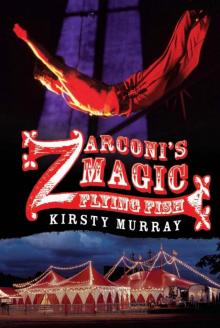 Zarconi’s Magic Flying Fish
Zarconi’s Magic Flying Fish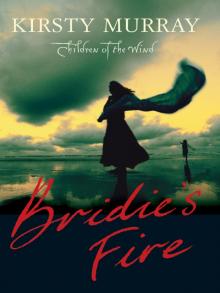 Bridie's Fire
Bridie's Fire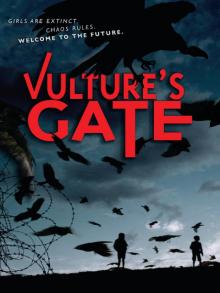 Vulture's Gate
Vulture's Gate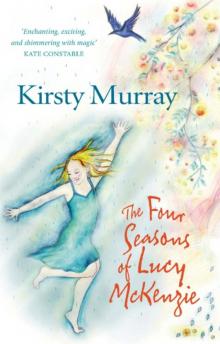 The Four Seasons of Lucy McKenzie
The Four Seasons of Lucy McKenzie A Prayer for Blue Delaney
A Prayer for Blue Delaney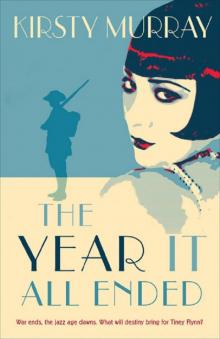 The Year It All Ended
The Year It All Ended India Dark
India Dark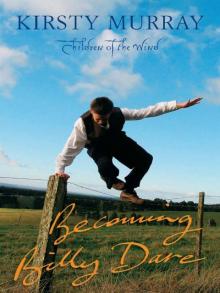 Becoming Billy Dare
Becoming Billy Dare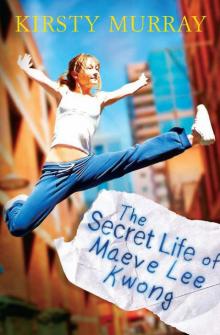 The Secret Life of Maeve Lee Kwong
The Secret Life of Maeve Lee Kwong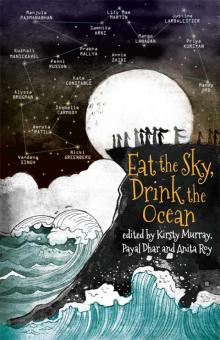 Eat the Sky, Drink the Ocean
Eat the Sky, Drink the Ocean